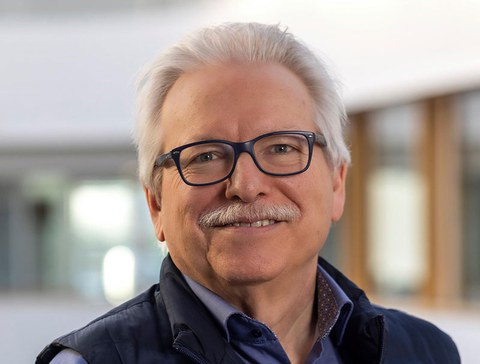Aug 11, 2025
Silver lining on the horizon
Dagmar Möbius
In the 19th century, mentally ill patients were treated at the site of the future headquarters of the German Center for Astrophysics. What is now set to emerge on the Kahlbaum estate in Görlitz, named after Karl Ludwig Kahlbaum, a pioneer of clinical psychiatry and rehabilitation, actually does sound a little crazy to the uninitiated. Yet the project symbolizes like no other the opportunities of transforming a disadvantaged region.

Founding Director Prof. Günter Hasinger
Patients have not been treated on the Kahlbaum estate for a long time. Many of the buildings are in ruins. It takes quite a bit of imagination to picture a future bastion of research being located here. 'We are in the first project phase,' says the designated founding director, Prof. Günter Hasinger. 'The German Center for Astrophysics will officially be established as an independent legal entity in late summer 2025.' Since 2023, it has been based at TUD Dresden University of Technology and at Deutsche Elektronen-Synchrotron (DESY). From 2026, the DZA is to stand on its own two feet. Around 100 people are already working for the center at two interim locations. The number is set to grow to more than 1,000. 'The new buildings will take another five years,' says Hasinger. But research will be conducted from the very beginning. Construction will have to take place in parallel.
World-class astrophysics in the heart of Europe
A large-scale national research center for astrophysics does not yet exist in Germany. The future Center for Astrophysics, Digitalization and Technological Development with cutting-edge research aims to act as a driver of innovation in Lusatia, helping the tri-border region of Germany, Poland, and the Czech Republic transition away from lignite. Hasinger calls the project a 'silver lining on the horizon'. Funding has been secured until 2038. The scientific concept includes astrophysics – the science that seeks to understand the universe – and new technologies and methods of data science.
Cosmic gluttons, stellar graveyards, and more
'Research at the limits of what is possible' is how Professor Günter Hasinger describes what astrophysics can and seeks to do: the exploration of physical phenomena, such as compact objects like black holes or other remnants of stellar graveyards. 'They open up so many avenues of research.' One research group, for instance, is developing algorithms to process data from the world’s largest radio telescopes. 'This is important for society, as it will be drowning in data in the future,' explains the passionate astrophysicist. Even now, the volume of telescope data is enormous. While telescopes once supplied only optical information, today they can also measure gravitational waves, cosmic radiation, and other signals. And there remain infinitely many further scientific challenges ahead.

DZA Workshop Innolabs
Seismic zero
'In the past, the world was like a silent film – now the sound is being added,' explains Professor Hasinger. If we imagine the universe as a bowl of jelly, these vibrations would be minuscule. All other sources of vibrations need to be excluded as much as possible – above all the seismic noise of the Earth. For interference-free measurements, researchers require absolute silence. To achieve this, they go deep below the earth's surface. Incidentally, the loudest signal down there is the sound of the sea, but even that needs to be suppressed using special control devices. They call this place 'the seismic zero'. They believe they have found it in a granite formation in Lusatia. Initial deep drilling tests give rise to the hope that the planned Low Seismic Lab, located somewhere between Hoyerswerda, Kamenz and Bautzen, 250 meters below ground, will be the future home of the Einstein telescope.
Keeping the passion alive
In addition to its scientific activities, the German Center for Astrophysics wants to share its vision with society and spark interest in astrophysics among children and young people. The large-scale research institute in Görlitz is seeking the brightest minds. Alumni will find open positions here.
The idea behind the German Center for Astrophysics in Lusatia in a film clip.
Contact:
Prof. Günter Hasinger
ESA Director of Science, Head of ESAC
Designated founding director of the DZ
